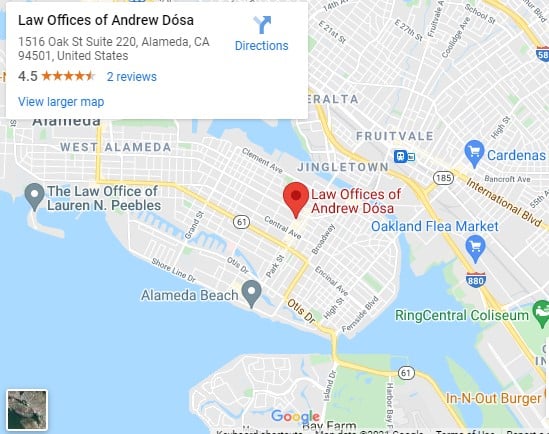Sex Crimes Attorney in Alameda, California
Sex offenses are some of the most severe charges a person could face, with the penalties often having severe personal, professional, and legal implications. Sex crime allegations hold a different type of stigma than most other crimes. After being convicted of a sex crime, you may be punished with steep fines, jail time, and registration as a sex offender.
Being labeled a sex offender could impact your entire life. Your reputation in the community will be tarnished, and you may find it problematic to find and maintain employment. If you are convicted of a sex crime, it is crucial to seek legal advice from a credible California criminal defense lawyer to help you protect your rights and freedom.
Why Do I Need a Sex Crimes Lawyer in California?
Are you accused of a sex crime in California? Aside from going through a complicated, expensive, and time-consuming legal system, you also have to deal with people treating you as if you were already convicted. That’s why you need an experienced Alameda sex crimes attorney who can fight for you every step of the way.
With over 20 years of experience as a criminal defense lawyer in Alameda County, Attorney Andrew Dósa has seen it all in defending clients accused of sexual crimes, such as rape or sexual assault, indecent exposure, child sex crimes, and more. From finding out what happened during an investigation and throughout the trial and sentencing, if necessary, the Law Offices of Andrew Dósa is here for you. Schedule a free consultation to talk to an experienced Alameda criminal defense attorney today!
What is a Sex Crime?
 In California, any non-consensual sexual act involving an adult is considered a sex crime. It involves offenses that usually arise when violence occurs during a sexual act, when someone engages in sex with an individual who is legally incapable of consent, or when there is a lack of agreement by one party to the sexual act. Suggestive behaviors, unwelcome sex or sexual touching, and other types of sexual misconduct fall under sex offenses.
In California, any non-consensual sexual act involving an adult is considered a sex crime. It involves offenses that usually arise when violence occurs during a sexual act, when someone engages in sex with an individual who is legally incapable of consent, or when there is a lack of agreement by one party to the sexual act. Suggestive behaviors, unwelcome sex or sexual touching, and other types of sexual misconduct fall under sex offenses.
Due to the nature of the offense, sex crimes are some of the most complex cases in the criminal justice system. If you’re facing allegations of sexual misconduct, you should speak to a skilled Alameda sex crimes attorney immediately to discuss your case and prepare your defense.
What are the Common Sex Crimes?
Any act that has a sexual motive is considered a sex crime. It is a broad category consisting of various offenses involving sexual conduct committed against someone. A qualified criminal defense attorney in Alameda County can help you understand the different types of sex crimes. Common examples of sex offenses include:
Sexual Assault & Sexual Battery
Sexual assault is a general category of an offense involving any sexual act done without the victim’s consent. It refers to unwanted and offensive sexual contact or touching, ranging from sexual groping to attempted rape. Penalties for a conviction depend on the specific circumstances and whether or not it is classified as a misdemeanor or felony.
Lewd Conduct
Lewd and lascivious conduct is defined as a sexual act offensive to community standards of decency. A person may be charged with lewd conduct if they engage in such conduct or solicit another person to engage in it. Each state has its interpretation of what may be considered lewd conduct.
Child Pornography
Child pornography is considered when there is any depiction of a minor or an individual who appears to be a minor engaged in sexual or sexually related conduct. The definition of child pornography is broad and includes any photographic, video, or digital depiction of a person under the age of 18 if it is created for the intent of sexual gratification of the viewer, even if the child is not actively engaged in a sexual act. Possession and distribution of child pornography is a sex crime punishable under state and federal laws.
Rape
Rape involves the act of forcible sexual intercourse with an unwilling participant that occurs through force, threats, violence, or in the absence of consent. It is also considered rape if a person cannot consent because they are mentally incapacitated, unconscious, or intoxicated.
The victim’s lack of consent is a crucial element in this crime. The criminal law will consider the victim incapacitated if the victim was physically incapable of indicating their unwillingness to participate in the sexual conduct or if they did not have the mental ability to understand the nature of the sexual acts.
Child Molestation
Child molestation is a sex offense that involves a range of indecent sexual conduct involving a child. It is a crime in California to annoy or molest a person who is under the age of 18. When the minor is the instrument of the perpetrator for sexual gratification or stimulation purposes, the actions may rise to the level of molestation.
Prostitution
Prostitution is engaging in a sexual act for money or other compensation. In most states, offering sexual services or agreeing to provide those services in exchange for money is considered prostitution whether or not the services are provided. It is also illegal for one to knowingly accept money earned from prostitution.
What are the Penalties for Sex Crimes?
Getting convicted of a sex crime has grave consequences. You’ll be required to register as a sex offender. Moreover, sexual offenses are punishable by incarceration, hefty fines, giving up certain assets, immigration consequences, and loss of the right to own a firearm. A knowledgeable sex crimes lawyer in Alameda CA can help you avoid harsh penalties and develop defense strategies that could reduce the sex crime charge or even convince the court to dismiss the criminal case.
For example, a misdemeanor sexual battery conviction is punishable by up to six months in county jail and a $2,000 fine. However, a felony conviction for sexual battery incurs a penalty of imprisonment for one to four years and a fine ranging from $2,000 to $10,000.
Call Our Seasoned Alameda Sex Crimes Attorney Now!
Being accused of a sex crime can be life-altering. California takes sex crimes very seriously, and the courts will severely punish the convicted. The ramifications of a conviction are wide-reaching and potentially devastating to many areas of your life. Professional and personal relationships, as well as educational pursuits, could be compromised by a successfully prosecuted criminal charge.
Challenging the victim’s testimony is not an easy feat if you’re facing sex crime allegations. In cases like this, it’s critical to pay attention to detail and build a strong defense for your case. If you have been arrested and charged with a sex crime, it is in your best interest to work with our competent Alameda sex crimes attorney at the Law Offices of Andrew Dósa. They can review your situation and provide a tenacious defense for you.
Our criminal defense law firm has an excellent understanding of the local courts and an extensive knowledge of California’s criminal justice system. We can answer questions and address your concerns regarding criminal defense, civil litigation, and estate planning. Call our law office now, or fill out the contact form to schedule a free initial consultation today.



